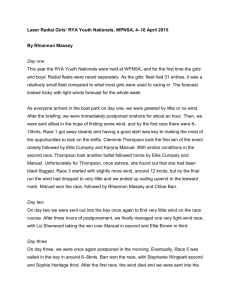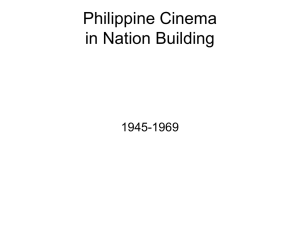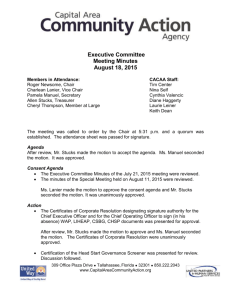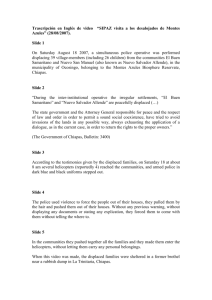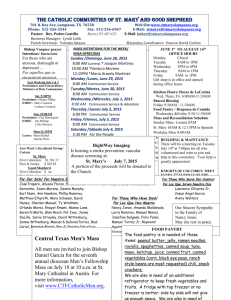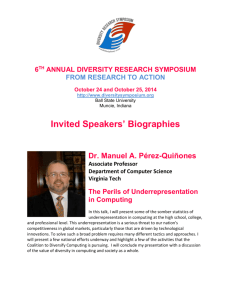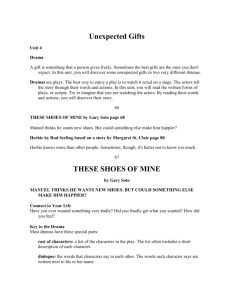here - The Sun is a ball of Iron!
advertisement
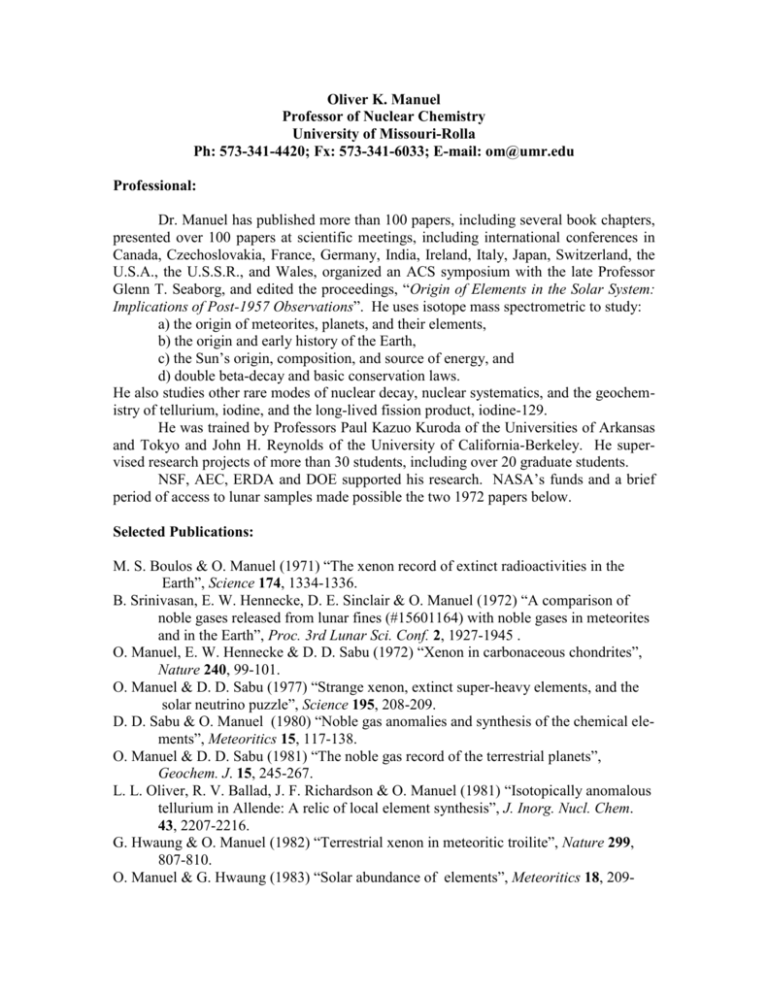
Oliver K. Manuel Professor of Nuclear Chemistry University of Missouri-Rolla Ph: 573-341-4420; Fx: 573-341-6033; E-mail: om@umr.edu Professional: Dr. Manuel has published more than 100 papers, including several book chapters, presented over 100 papers at scientific meetings, including international conferences in Canada, Czechoslovakia, France, Germany, India, Ireland, Italy, Japan, Switzerland, the U.S.A., the U.S.S.R., and Wales, organized an ACS symposium with the late Professor Glenn T. Seaborg, and edited the proceedings, “Origin of Elements in the Solar System: Implications of Post-1957 Observations”. He uses isotope mass spectrometric to study: a) the origin of meteorites, planets, and their elements, b) the origin and early history of the Earth, c) the Sun’s origin, composition, and source of energy, and d) double beta-decay and basic conservation laws. He also studies other rare modes of nuclear decay, nuclear systematics, and the geochemistry of tellurium, iodine, and the long-lived fission product, iodine-129. He was trained by Professors Paul Kazuo Kuroda of the Universities of Arkansas and Tokyo and John H. Reynolds of the University of California-Berkeley. He supervised research projects of more than 30 students, including over 20 graduate students. NSF, AEC, ERDA and DOE supported his research. NASA’s funds and a brief period of access to lunar samples made possible the two 1972 papers below. Selected Publications: M. S. Boulos & O. Manuel (1971) “The xenon record of extinct radioactivities in the Earth”, Science 174, 1334-1336. B. Srinivasan, E. W. Hennecke, D. E. Sinclair & O. Manuel (1972) “A comparison of noble gases released from lunar fines (#15601164) with noble gases in meteorites and in the Earth”, Proc. 3rd Lunar Sci. Conf. 2, 1927-1945 . O. Manuel, E. W. Hennecke & D. D. Sabu (1972) “Xenon in carbonaceous chondrites”, Nature 240, 99-101. O. Manuel & D. D. Sabu (1977) “Strange xenon, extinct super-heavy elements, and the solar neutrino puzzle”, Science 195, 208-209. D. D. Sabu & O. Manuel (1980) “Noble gas anomalies and synthesis of the chemical elements”, Meteoritics 15, 117-138. O. Manuel & D. D. Sabu (1981) “The noble gas record of the terrestrial planets”, Geochem. J. 15, 245-267. L. L. Oliver, R. V. Ballad, J. F. Richardson & O. Manuel (1981) “Isotopically anomalous tellurium in Allende: A relic of local element synthesis”, J. Inorg. Nucl. Chem. 43, 2207-2216. G. Hwaung & O. Manuel (1982) “Terrestrial xenon in meteoritic troilite”, Nature 299, 807-810. O. Manuel & G. Hwaung (1983) “Solar abundance of elements”, Meteoritics 18, 209- J. M. D. MacElroy & O. Manuel (1986) “Can intra-solar diffusion contribute to isotope anomalies in the solar wind?”, J. Geophys. Res. 91, D473-D482. J. T. Lee, B. Lin & O. Manuel (1996) “Terrestrial-type xenon in sulfides of the Allende meteorite”, Geochem. J. 30, 17-30. J. T. Lee, B. Lin & O. Manuel (1997) “On the signature of local element synthesis”, Comments on Astrophysics 18, 335-345. O. Manuel, J. T. Lee, J. M. D. MacElroy, B. Li & W. K. Brown (1997) “Origin of our elements and evolution of the solar system”, in Isotopes in the Solar System (Physical Research Laboratory, Ahmedabad, India, eds., J. N. Goswami, S. Sahijpal, P. Chakrabarty) 15-16. O. Manuel (1998) “ Origin of the solar system and its chemical elements”, in Lunar and Planetary Science XXIX, Abstract 1974, available as 1974-pdf file from Lunar and Planetary Institute, Houston, TX (CD-ROM) O. Manuel (1998) , “Isotopic ratios in Jupiter confirm intra-solar diffusion” Meteoritics 33, A97. O. Manuel, K. Windler, A. Nolte, L. Johannes, J. Zirbel & D. Ragland (1998) “Strange xenon in Jupiter”, 238, 119-121. O. Manuel, J. T. Lee, D. E. Ragland, J. M. D. MacElroy, B. Lee & W. K. Brown (1998) “Origin of the solar system and its elements”, J. Radioanal. Nucl. Chem. 238, 213-225. O. Manuel (2000) “Origin of elements in the solar system” in Origin of Elements in the Solar System: Implications of Post-1957 Observations, Proceedings of the 1999 ACS symposium organized by Glenn T. Seaborg and Oliver K. Manuel (Kluwer Academic/Plenum Publishers, New York, NY, USA, ed., Manuel O.), 589-287. O. Manuel (2000) “Isotopic ratios: The key to elemental abundance and nuclear reactions in the Sun” in ibid., pp. 279-287. O. Manuel, C. Bolon, M. Zhong & P. Jangam (2001) “The Sun’s origin, composition and source of energy” in Lunar and Planetary Science XXIX, Abstract 1041, available as 1041-pdf from Lunar and Planetary Institute, Houston, TX (CD-ROM). O. Manuel, C. Bolon, A. Katragada & M. Insall (2001) “Attraction and repulsion of nucleons: Sources of stellar energy”, J. Fusion Energy 19, 93-98. O. Manuel & C. Bolon (2002), “Nuclear systematics: I. Solar abundance of the elements”, J. Radioanal. Nucl. Chem. 251, 381-385. O. Manuel, C. Bolon & P. Jangam (2002), “Nuclear systematics: II. The cradle of the nuclides”, J. Radioanal. Nucl. Chem. 251, 417-422. O. Manuel, C. Bolon & M. Zhong (2002), “Nuclear systematics: III. The source of solar luminosity”, J. Radioanal. Nucl. Chem. 252, 3-7. Education: Manuel attended public schools in Wichita and Viola, Kansas, in White Oak and Ada, Oklahoma, in Mena, Arkansas, in Beaumont and Dennison, Texas. He did not complete high school but was admitted to Kansas State College-Pittsburg in 1956. He obtained a BS degree there, MS and PhD degrees from the University of Arkansas, and performed postdoctoral research there and in physics at the University of California-Berkeley. He studied under Professors Jim Pauley, Paul Kazuo Kuroda, and John H. Reynolds.
